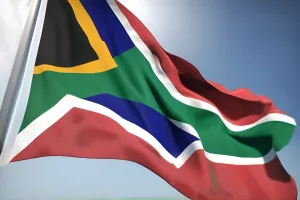The South African cricket team, the Proteas, are on the verge of making history by reaching their firstever World Cup final. Fans all over the world are excited about their impressive journey, which was led by strong performances from their bowlers and batsmen. With a combination of skill and strategy, the Proteas have defied past perceptions of being ‘chokers’ and are now eyeing a triumphant moment in their cricketing history. Cricket enthusiasts eagerly await the final, where the Proteas will face either India or England.
Transformative Restructuring of the Committees within the National Council of Provinces
The transformative restructuring of the National Council of Provinces (NCOP) during its inaugural meeting in 2024 consolidated Select Committees from eleven to ten and formed a Subcommittee on the Review of the Council Rules and Programming Committee of the 7th Parliament. The Select Committees act as the “engine room” for provincial matters and the Council’s overall function, while the NCOP plays a fundamental role in safeguarding provincial interests within Parliament. The restructuring aims to enhance efficiency and oversight over different government departments, propelling the NCOP towards greater efficiency and effectiveness.
The Conundrum of Development: The Prolonged Rollout of South Africa’s 2024 Driver’s Licence Cards
South Africa’s Department of Transport has faced obstacles in securing service providers for the launch of the 2024 driver’s license cards, causing delays and frustration among citizens. The procurement process has been slow and lacking transparency, leading to public distrust. Despite reassurances from the Transport Minister, the project remains mired in controversy and technical intricacies. The department has received offers from five companies and has new printing machinery, but contradictory information and inconsistencies have left the public uncertain about when the cards will be available.
South Africa’s politics is changing as the ANC’s support declines and a Government of National Unity (GNU) is formed with the DA and other political groups. However, tension between the ANC and DA is growing, as the DA demands control over crucial government departments and the termination of contracts of director generals. This has led to criticism from the ANC and a potentially rocky road for political transition. The path forward requires tolerance, accommodation, and respect for the country’s Constitution to establish a truly inclusive, efficient, and representative GNU.
Period poverty is a major issue affecting over 80% of South African schoolgirls, who lack access to sanitary products and proper menstrual hygiene education. The IMenstruate Movement is campaigning for free menstrual hygiene products to combat this problem. The recent Exesheni Exhibition in Franschhoek shed light on the severity of the situation, with photographs of makeshift solutions like rags, cardboard, and toilet paper. The IMenstruate Movement plans to lobby President Cyril Ramaphosa for change and spread awareness in rural communities.
Preparations Amidst Challenges: South Africa’s Springboks Brace for Mid-year Test Matches
South Africa’s Springboks face midyear test matches without eight crucial players, including six World Cup victors, due to injuries. However, the team’s vast talent pool, including four new players, indicates their resilience and ability to adapt in the face of adversity. Despite the challenges, the Springboks are poised to showcase their grit and deliver an exhilarating display of rugby.
The Goo Goo Dolls are embarking on a highlyanticipated tour in South Africa, starting at Kirstenbosch Gardens in Cape Town on December 4. The tour promises to be a celebration of music, history, and shared experiences with local acts Just Jinjer and Roan Ash joining the band on stage. The concerts will be a convergence of music enthusiasts under the stars, relishing the allure of rock music.
The ANC and DA are locked in a power struggle for control of key positions in South Africa’s Government of National Unity, including the deputy presidency and major economic departments. The DA has presented several demands, including ten ministerial portfolios, and is unwilling to compromise. The potential delay in forming the GNU Cabinet highlights the difficulties in building an effective government and underscores the constantly evolving landscape of South Africa’s political arena.
Swearingin ceremonies are important in South Africa’s Parliament as they signify the commitment of Members of the National Assembly to uphold the Constitution and represent the interests of the people. The recent swearingin of 58 MK Party Members was a significant event that took place in the Goodhope Chamber, overseen by the Chief Justice or a judge appointed by him. The ceremony showcased the inclusive and progressive nature of South Africa’s Parliament, which also includes an annual review of the Constitution by a joint committee of Parliament.
South Africa is transitioning towards a new era of identity documentation, phasing out the use of the green barcode ID book in favor of the smart ID card. With over 21 million distributed, the smart ID card offers superior security and functionality, including defense against identity theft and fraud. The government is aiming to distribute an additional 17 million smart ID cards to ensure a smooth transition towards digitalization, reflecting their dedication to refining systems and procedures for the convenience and wellbeing of its citizens.
Operation Vala Umgodi is a significant milestone in South Africa’s fight against illegal mining. Led by the South African Police Service, National Defence Force, and National Intervention Unit, the joint effort resulted in the capture of a notorious illegal mining kingpin and the apprehension of three suspects. The operation showcases the power of collaboration and vigilance and sends a strong message that South African authorities have zero tolerance for illicit activities that harm their nation. It also signifies a changing narrative in South Africa’s relentless pursuit of justice.
Table Mountain National Park in South Africa is facing a crisis due to an alarming increase in fires, with 119 fires documented in one year alone. The fires are caused by a variety of factors ranging from everyday activities to natural phenomena like lightning strikes. Despite the challenges, TMNP has adapted its strategies and formed partnerships with firefighting organizations to combat the fires. The resilient individuals who work to protect the park every day showcase an unwavering love for the environment and an indomitable spirit.
South Africa has launched the National Free Basic Electricity initiative, which provides eligible households with free electricity vouchers up to a limit of 5060 kWh per month. Local municipalities will reimburse Eskom, the principal electricity provider in South Africa, for the cost of the initiative. The program aims to reduce the financial burden of basic municipal services for indigent households, promoting energy inclusivity and equity in South Africa. This initiative is a significant breakthrough for South Africa’s energy landscape, offering essential energy to those in need and paving the way for other countries to tackle similar challenges.
President Cyril Ramaphosa’s inauguration marked the start of a new era for South Africa. He pledged to tackle corruption, address socioeconomic disparities, and unite political factions. Ramaphosa emphasized the need for public service and committed to upholding the Constitution to create a more resilient, equal, and united nation. The ceremony was a historic moment that showcased South Africa’s dynamic democracy and unwavering commitment to progress and unity.
The Expanded Public Works Programme (EPWP) presents a promising solution for the improvement of South Africa’s informal settlements, which have been plagued by policy confusion and administrative red tape. EPWP workers, often residents of the communities they serve, could manage intricate relationships necessary for upgrading informal settlements and repair strained relationships between informal communities and their municipal governments. To fully harness the potential of the EPWP, changes such as lengthening the employment limit and creating pathways for workers to transition into municipal human settlement departments are necessary, which could become an emergency lifeline for stalled housing and upgrading projects.
South African Men: A Combination of Charisma and Physical Appeal in the International Limelight
South African men are gaining international recognition for their physical appeal and charisma. Recent research has positioned South Africa among the top ten nations with the most attractive men, with winners of prestigious beauty contests such as Manhunt International and Mister Global coming from the country. South African men are also known for their linguistic charm, making them a unique blend of physical appeal and cultural richness. This recognition stands as a testament to the nation’s diverse cultural heritage, dynamic spirit, and undeniable allure.
















